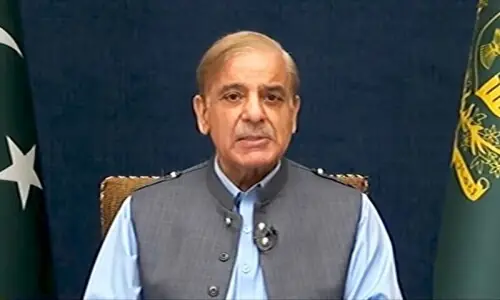• Shamshad says caretaker govt prioritises tax net expansion, targets retail and real estate sectors
• Insists subsidies not viable, urges exporters to shift business model
• Says economic revival plan to be unveiled soon
• BISP to be partially transferred to provinces
ISLAMABAD: Pakistan is seeking around $11bn in bilateral support from China and Saudi Arabia as the caretakers push for expanding the tax net effectively to retail, agricultural and real estate sectors while continuing a crackdown on illegal currency movements to fill external and domestic resource gaps so that the IMF programme remains on track to ensure economic stability until an elected government takes power.
This was part of a detailed policy statement issued by caretaker Finance Minister Dr Shamshad Akhtar before the Senate Standing Committee on Finance and Revenue, presided over by Senator Saleem Mandviwalla in Islamabad on Thursday.
Dr Akhtar also talked about partially transferring the Benazir Income Support Programme to provinces under an IMF requirement. She lamented that exporters were still seeking subsidies despite economic challenges and strongly ruled out the possibility of such freebies.
She said the government was currently working on an economic revival plan that would be presented to the caretaker prime minister shortly and shared with the Senate Standing Committee on Finance.
She said the caretaker government had a limited scope to undertake deep-rooted structural reforms but promised to deliver on reforms that were part of the IMF programme to ensure the disbursement of a $700 million loan instalment. Talks with the IMF would begin by the end of October in this regard.
The finance minister said it was the government’s priority to deliver on the Fund programme to ensure economic stability and continuity.
‘Financing needs still higher’
On the external financing gap, Dr Akhtar said the country’s financing needs were still higher, but with the joint efforts of all stakeholders, the government would be able to secure disbursements from the project pipeline and also revive some policy-based financing from multilaterals.
External flows would improve with the $700m flows from the IMF. For net bilateral financing of $11bn, China and Saudi Arabia had been requested along with a request for a Saudi oil facility, she said.
“To meet the external financing requirements, we are working to secure concessional funding from multilaterals (World Bank, Asian Development Bank, Islamic Development Bank) of $6.3bn,” she said in her written statement, adding that the IMF had already approved $3bn and bilateral assistance of around $10bn was also expected.
She explained that under the current IMF loan deal, the authorities were committed to increasing State Bank’s reserves to $9bn (2.3 months of import cover) shortly and to $12bn (three months of import cover) by June 2024 based on higher official inflows and pick-up in Foreign Direct Investment (FDI) under the Special Investment Facilitation Council (SIFC).
At the same time, Dr Akhtar warned that a “key risk to external stability comes from the rise in international commodity prices”, as Brent crude oil prices have jumped to $95 per barrel in September, an increase of 27pc from $74 per barrel in June.
Pakistanis ‘living beyond means’
The caretaker minister claimed that Pakistanis had developed a habit of living beyond means and successive governments had borrowed debts without investing them in high-return projects.
The public debt rose sharply over the last two years, mainly because of devaluations and interest rate hikes. She said domestic debt had declined to 45.8pc of GDP in FY23 from 47pc in FY21 but external debt-to-GDP ratio increased to 42pc in FY23 from 34.5pc in FY21.
She deplored that even the debt relief from G20 countries for the poor nations had also been consumed without ensuring high-return investments.
She said the authorities were also working on amending laws to bring retail, agriculture and real estate into an effective tax net because no government could ever control twin deficits without doing this.
The minister said tax measures for the retail sector could be started as this sector had been very profitable since the Covid-19 days. However, she recalled that past efforts had raised hue and cry and stressed that political parties would have to play their role in this regard.
However, she said that agriculture was a provincial subject and a new government would have to fight this battle. She said the FBR had promised to modernise technology to enhance tax compliance while steps were in progress for wealth tax on movable assets and remove tax exemptions.
Dr Akhtar said the caretaker government was seeking support from courts to get the pending cases resolved to generate an additional Rs3 trillion.
She said the biggest challenges to the fiscal side included about Rs3.2tr power circular debt and an almost similar gap in the gas sector and the ever-bleeding Pakistan International Airlines.
She said Pakistan was not in a position to provide subsidies and duty drawbacks to industries and exporters, who would have to change their business models to invest in exports themselves. Only countries having $400bn in foreign exchange reserves could afford that, she said.
She said the gap between the demand and supply of dollars was reflected in the current account deficit, which declined $2.4bn (0.7pc of GDP) in FY23 from $17.5bn (4.7pc of GDP) in FY22 and further dropped by 54pc in the first two months of this fiscal year to $900m.
Last year, there was a 14pc decline in workers’ remittances, which fell to $ 27bn from $31.3bn a year ago. During the first two months of the current year, remittances have dropped by 8.5pc.
When the caretaker government took office in mid-August, the dollar was trading at 295 to the rupee in the interbank market, a decline of 45pc since June 2022. The open market rate was even higher at 304, with spreads of around 3pc to 7pc.
The rupee’s devaluation was a major driver of record-high inflation last year, Dr Akhtar said, adding the government had taken action against the speculative activity of the exchange companies, resulting in a stronger local currency.
Published in Dawn, September 29th, 2023

































